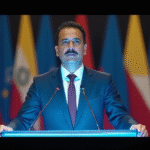Background on the Issue
In Mexico, civil organizations have raised concerns about potential press censorship arising from a recently approved telecommunications reform. The new law, titled “Ley en Materia de Telecomunicaciones y Radiodifusión,” was sent by President Claudia Sheinbaum to the United Commissions of Radio, Television, and Cinematography; Communications and Transportation; and Legislative Studies of the Senate. The commissions approved the reform without any changes.
Concerns Raised by Organizations
Article 19, an international non-governmental organization dedicated to defending freedom of expression, highlighted several issues with the new law. They pointed out that the administration of radio-electric spectrum and the granting of concessions may be influenced by political considerations rather than public interest. This could potentially allow the removal of concessions from independent and critical media outlets based on subjective, unfounded, or ambiguous reasons.
Furthermore, Article 19 expressed concern that the law grants the executive branch the power to block digital platforms. They emphasized that blocking any digital application or service, temporarily or permanently, is unconstitutional. International human rights standards prohibit the establishment of any means intended to obstruct communication and the circulation of ideas and opinions, such as blocking digital platforms.
R3D’s Concerns Regarding User Registration
The Red en Defensa de los Derechos Digitales (R3D) also raised concerns about Article 8, fraction LXV of the new law. This article gives the Digital Agency the authority to establish guidelines for registering mobile service users, which will be managed by concessionaires and authorized entities providing the service. This registration is mandatory for users.
R3D warned that this provision attempts to create a new registration system, similar to the National Mobile Users Registry (PANAUT), which was declared unconstitutional by Mexico’s Supreme Court of Justice in 2022.
President’s Response
On the same day, President Claudia Sheinbaum denied that the new law would lead to censorship. She stated, “At no point are we proposing censorship, as we are against censorship. In any case, there is a draft that needs to be corrected regarding digital platforms.”
Key Questions and Answers
- What is the new telecommunications reform in Mexico? The new law, titled “Ley en Materia de Telecomunicaciones y Radiodifusión,” was recently approved by the United Commissions of Radio, Television, and Cinematography; Communications and Transportation; and Legislative Studies of the Senate without any changes.
- What concerns have civil organizations raised about the new law? Civil organizations, including Article 19 and R3D, have expressed concerns about potential press censorship, political influence in the administration of radio-electric spectrum and concessions, and the unconstitutional blocking of digital platforms. They also warn against the creation of a new user registration system similar to the previously declared unconstitutional PANAUT.
- How has President Claudia Sheinbaum responded to these concerns? President Claudia Sheinbaum has denied that the new law would lead to censorship, stating that there is a need to correct the draft regarding digital platforms.






